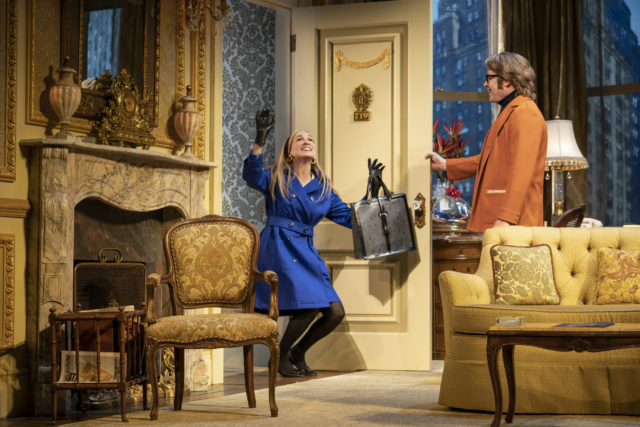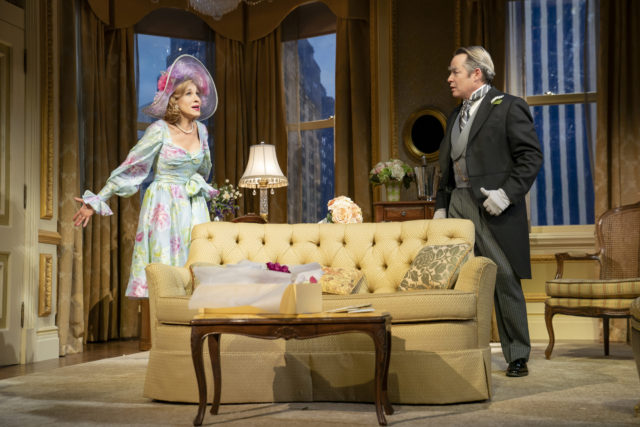
The Nashes (Sarah Jessica Parker and Matthew Broderick) try to celebrate their anniversary in Neil Simon’s Plaza Suite (photo by Joan Marcus)
PLAZA SUITE
Hudson Theatre
141 West Forty-Fourth St. between Sixth & Seventh Aves.
Tuesday – Sunday through June 26, $99-$559
plazasuitebroadway.com
Some playwrights age better than others. It’s been more than ten years since the last Neil Simon revival on Broadway, and if the current production of Plaza Suite at the Hudson Theatre is any indication, at least part of the reason why is evident.
The three-act play, which opened on Broadway on Valentine’s Day, 1968, is a slapstick love letter to marriage written with a poison pen. In each act, a couple, portrayed by the same actors, flirt and argue as they evaluate their relationships and their lot in life as they flit about in room 719 at the Plaza Hotel in midtown Manhattan. The original featured George C. Scott and Tony nominee Maureen Stapleton and was directed by Tony winner Mike Nichols; the current revival stars Matthew Broderick and Sarah Jessica Parker, who are married in real life, with John Benjamin Hickey directing the fusty festivities. The play might be set in 1968–69, but it feels a whole lot older than that, especially in its Neanderthal portrayal of women.
“Visitor from Mamaroneck” takes place on a late winter afternoon at the Plaza, where Karen Nash (Parker) has planned a romantic getaway with her workaholic husband, Sam (Broderick), to celebrate their anniversary in the same room where they spent their wedding night more than twenty years earlier. Karen orders Champagne and hors d’oeuvres, but when Sam arrives, he is overwhelmed with business issues.
While he is a wiz with figures, she has trouble with any kind of number, which slides right into gender stereotypes. After she claims that it’s their twenty-fourth anniversary, Sam responds, “Tomorrow is our anniversary and we’re married twenty-three years.” She asks, “Are you sure?” Sam: “I go through this with you every year. When it comes to money or dates or ages, you are absolutely unbelievable. We were married December fifteenth, nineteen forty-five.” Karen: “Then I’m right. Twenty-four years.” Sam: “Forty-five from sixty-eight is twenty-three!” Karen: “Then I’m wrong. Math isn’t one of my best subjects.”
When Sam’s devoted, and devilishly sexy, secretary, Jean McCormack (Molly Ranson), shows up, things take a turn for the worse, although not at all unexpectedly. In fact, we can see what’s coming from the proverbial mile away as occasionally funny banter transforms into a terrible, unfair weight on Karen (and Sarah).

A New Jersey housewife (Sarah Jessica Parker) and a Hollywood producer (Matthew Broderick) have a clandestine meeting in Neil Simon revival (photo by Joan Marcus)
“Visitor from Hollywood” is set the following spring, with hotshot Hollywood producer Jesse Kiplinger (Broderick) meeting his high school flame, Muriel Tate (Parker), in room 719. She’s an uptight New Jersey suburban housewife and mother obsessed with his success; she dreams of the glamorous life he’s leading, but he just wants to get into her pants. As he plies her with vodka stingers, she grows friendlier and friendlier even as she protests that she has to get home and take care of her family, although she’s pretty shifty about the details. It’s evident her “I never do things like this!” housewife shtick is . . . just shtick. She knows what she wants: proximity to fame. He wants proximity to her. Close proximity.
The play reveals its age in this act with its outdated references, from Bonwit and Lee Marvin to Elke Sommer and Marge and Gower Champion, which will leave younger audiences scratching their heads (or desperately wanting to Google the names right there and then). “Will you stop with the celebrity routine. Aside from a couple of extra pounds, I’m still the same boy who ran anchor on the Tenafly track team,” Jesse says. Muriel replies, “And is living in the old Humphrey Bogart house in Beverly Hills.” In 2022 — if not in 1968 — it’s tremendously uncomfortable watching a single male Hollywood producer trying to take advantage of a woman in a hotel room, regardless of how happy or not she is.
The play concludes in June 1969 with “Visitor from Forest Hills,” in which Roy and Norma Hubley (Broderick and Parker) are in room 719 at the Plaza, preparing for the wedding of their daughter, Mimsey (Ranson); the only problem is that Mimsey has locked herself in the bathroom and refuses to come out and marry Borden Eisler (Eric Wiegand). Roy and Norma try just about everything to get Mimsey to open the door, as Roy trots out jokes so old they have cobwebs about fathers and wedding costs.

Norma (Sarah Jessica Parker) and Roy (Matthew Broderick) are facing a wedding crisis in Plaza Suite at the Hudson (photo by Joan Marcus)
“All right, what did you say to her?” Roy demands to know. Muriel answers, “I knew it! I knew you’d blame me. You took an oath. God’ll punish you.” Roy explains, “I’m not blaming you. I just want to know what stupid thing you said to her that made her do this.” As they attempt to lure their daughter out of the bathroom, Roy ratchets up the blaming of the women while Norma keeps the truth from the ever-more-worried Eislers downstairs.
The best parts of this Plaza Suite, which runs slightly more than two and a half hours with an intermission and a brief pause, are John Lee Beatty’s gorgeous set, which gets its own well-deserved round of applause; Jane Greenwood’s costumes, especially the glorious outfits worn by Parker; and the stars’ undeniable chemistry and gift for physical comedy. There is some potent slapstick from Broderick (Evening at the Talk House, Shining City), who has appeared in three previous Simon plays, and Parker (The Commons of Pensacola, The Substance of Fire), who last worked with Broderick onstage in the 1995 Broadway revival of How to Succeed in Business without Really Trying; at one point in the second act, after Parker pulled off a hilarious move, both actors tried unsuccessfully to suppress their own laughter. The third act is highlighted by an outrageously funny stunt by a nearly unrecognizable Broderick, in gray wig and mustache and elegant tux. [Note: Both Broderick and Parker have contracted Covid-19 so the show has been temporarily shut down as of April 7.]
But standout moments here and there do not make up for the misogyny that is on view in all three acts, filling the theater with a dense cloud of midcentury woman hating. It’s also hard to get too excited about watching the foibles of wealthy white people in a fancy schmancy hotel room. The first of a trilogy that was followed by California Suite in 1976 and London Suite in 1995, Plaza Suite feels old, crusty, and unnecessary today, unless they’re going to redefine some of the characters or experiment more with the staging. Playing it straight in 2022 is just not viable, and it has nothing to do with political correctness.
Simon — who was nominated for four Oscars and four Emmys, won four Tonys and a Pulitzer Prize (for 1991’s Lost in Yonkers), and had a Broadway theater named after him in 1983 — was ultimately married five times to four women (three actresses and a dancer); this is the first revival of one of his plays since his death in 2018 at the age of ninety-one. Hopefully the next one will do more to burnish his legacy.